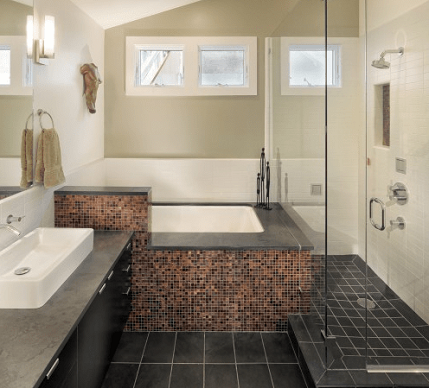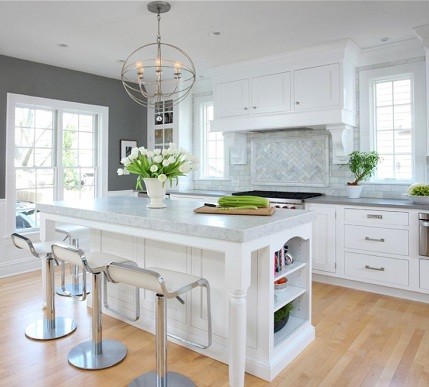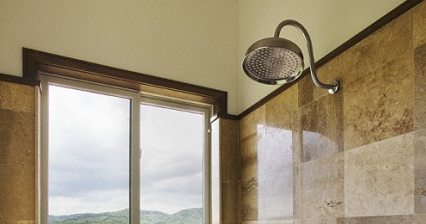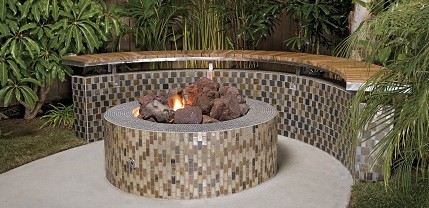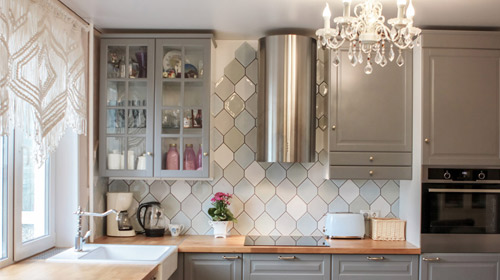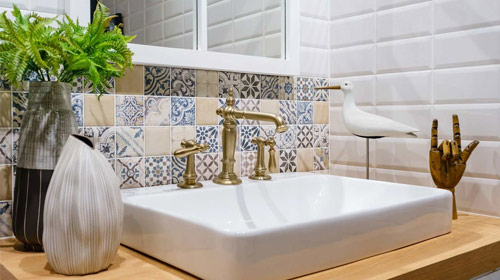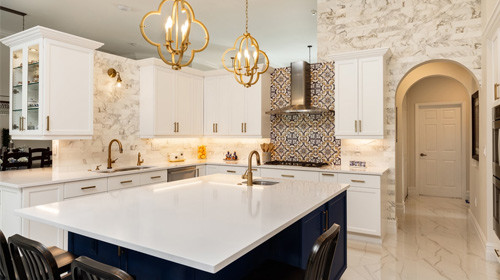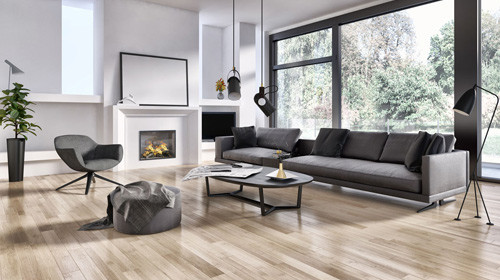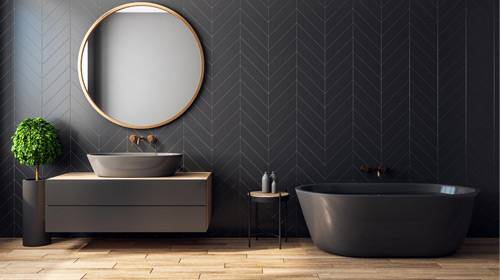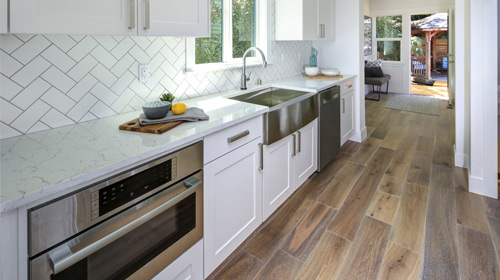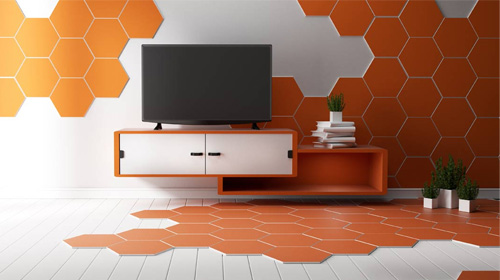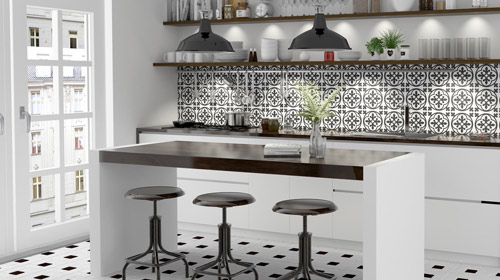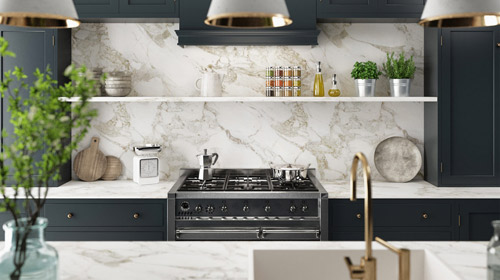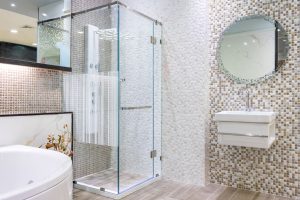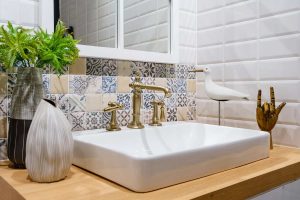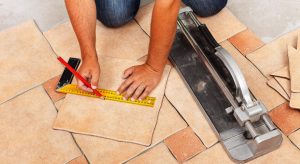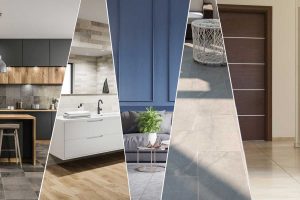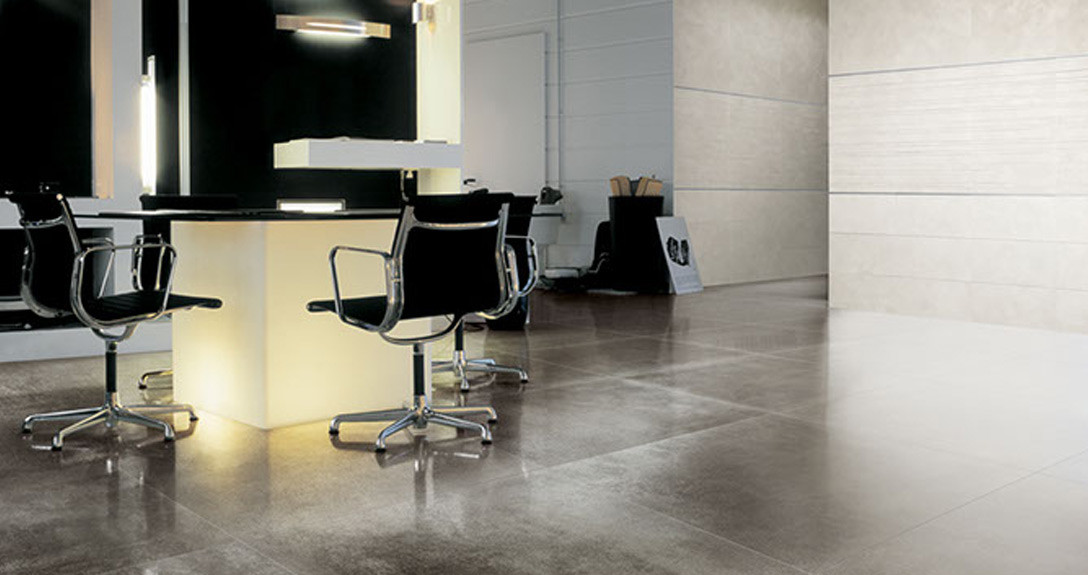
Ceramic vs. Porcelain Tiles For Commercial-Grade Flooring
- » Always ask about a tile’s PEI Rating (i.e. hardness and density) to decide if it’s suitable for your flooring or application.
- » Because porcelain tile is more dense and durable, it usually costs more than ceramic tile.
- » Porcelain tiles are better suited for commercial-grade and outdoor spaces because they are more water-resistant.
Kitchen & Bathroom Tile Designs That Stand The Test Of Time
Whether you’re installing new tile floors and walls in your home’s kitchen or bathroom, a commercial building, or an office space, you want quality that enhances your lifestyle while withstanding long-term use at the same time. At Westside Tile And Stone, we combine the style and function of commercial tiles for effortless designs that last for years to come. We believe that tile flooring should be commercial-grade no matter the room or space.
Within our comprehensive catalog are two of the most popular tile options for homeowners, property owners, and property managers: ceramic and porcelain. Sometimes used interchangeably, ceramic and porcelain tiles are actually quite different when it comes to their overall aesthetic and singular attributes. With the help of this design guide, learn more about ceramic and porcelain tiles, so you can make an informed decision when installing commercial-grade tile flooring.
Ceramic & Porcelain Tiles: What’s The Difference?
When inundated with a variety of styles and materials, tile terminology can get confusing. Keep in mind that many types of tiles are made from clay or a mixture of clay and minerals before being kiln-fired. Ceramic tiles actually encompass two categories: non-porcelain and porcelain. Non-porcelain tiles are typically referred to as “ceramic” tiles, while porcelain tiles remain distinct.
Technically a subcategory of tiles, porcelain tiles tend to be stronger, denser, and more aesthetically pleasing–making them a more viable option for commercial-grade tile flooring. Not only can porcelain tiles withstand higher rates of foot traffic, but they are also more water-resistant than non-porcelain ceramic tiles.
A Closer Look At PEI Ratings
When choosing non-porcelain or porcelain floor tiles for your new and improved tile flooring, density plays a key role in deciding which tiles are the most ideal for residential rooms like kitchens and bathrooms as well as commercial spaces. Keep in mind that not all-ceramic or porcelain tiles are suitable for any area. The density of tile is rated from low to high according to its PEI class of hardness. Floor tiles tend to be denser and can thus also be used on walls, but not vice versa. If installed on a floor, wall tiles will crack and be a risk to safety and liability due to their low water-resistance.
The Porcelain Enamel Institute (PEI) is a volunteer group of enamelers, Tile professionals, and companies that provide equipment, materials, and technology to make ceramic and porcelain tiles. The PEI headquarters are located in Norcross, Georgia, and they’ve been promoting and making advancements in the tile industry since established in 1930. One of their well-known advancements is the PEI Class Rating, which gives homeowners and builders a clearer idea about how dense a tile ought to be according to where it’s installed.
- » Class Rating 1: Unsuitable for any foot traffic–wall use only.
- » Class Rating 2: Can withstand light foot traffic–perfect for bathroom floors and walls.
- » Class Rating 3: Handles light to moderate foot traffic–ideal for the following applications: walls, countertops, and floors.
- » Class Rating 4: Durable enough for moderate to heavy foot traffic–fully accommodates residential applications as well as medium commercial and light institutional installed flooring.
- » Class Rating 5: The most durable tile option for heavy to extra-heavy traffic in all types of residential, commercial, and institutional spaces.
» Ceramic Tile 101
Ceramic tiles or more specifically, non-porcelain tiles, are generally made from red or white clay and fired in a kiln. Afterwards, they are given a durable glaze as a finish, which helps to preserve the color and pattern of the tile. In some cases, ceramic floor tiles can be left unglazed with their natural color intact (like terra cotta) or can feature more stylized surfaces that are glazed with your choice of a high gloss or matte finish. Ceramic tiles remain versatile, accommodating both wall and floor applications.
Also, keep in mind that ceramic tiles tend to be softer and easier to cut than porcelain tiles and usually have a PEI rating ranging from 0 to 3. Ceramic tiles can withstand very light to moderate foot traffic but also have high water-absorption rates that make them less frost-resistant. Ceramic tiles are also known to be more prone to wear and tear and chipping than porcelain tiles.
» Porcelain Tile 101
Developed from their ceramic tile counterparts, porcelain tiles fuse form and function, making them very popular among homeowners who want commercial-grade tile floors. Porcelain tile is designed by means of dust pressed method from clays mixed with feldspar and fired at much higher temperatures than ceramic tiles. As a result of this process, porcelain tiles are more dense, less porous, much harder, and less prone to moisture and stain absorption than ceramic tiles. Thus, porcelain tiles remain versatile–ideal for both indoor and outdoor applications. With a much lower water absorption rate (less than 0.5% to be exact), porcelain tiles are more frost-resistant or frost-proof than ceramic tiles.
Because porcelain tiles are more durable and less damage-prone, they are perfect for any flooring or application–from light foot traffic areas in residential homes to heavier foot traffic in commercial areas. Furthermore, full-body porcelain tiles carry the color and pattern throughout the entire thickness of the tile, making wear and tear nearly impossible. Found in industrial and institutional settings as well as commercial and residential tile flooring, porcelain tiles are available in matte, unglazed, or high gloss finishes as well as intricate designs–without sacrificing their overall durability.
Additional Tile Tips And Trivia
Although ceramic and porcelain tiles are very similar, they have very distinct differences. Because porcelain tile is more dense, durable, and water-resistant, it costs more. However, porcelain tile floors will last longer and require less maintenance over the years. If you plan on installing porcelain tiles yourself, keep the following hacks and tips in mind!
Because porcelain is harder and denser, it is actually quite difficult to cut. As a contractor or DIY’er, consider getting a wet saw that has a diamond blade, which will be strong enough to cut through porcelain tiles while reducing the risk of breakage you experience with a standard saw.
Also, when installing non-porcelain ceramic tiles or porcelain tiles, don’t forget to seal the grout. Grout is basically sand and accumulates dirt, wears down, and chips away with long-term use. A good grout sealer will protect the grout with an antibacterial agent that will prevent more dirt and debris from accumulating in between your tiles. It also preserves color and overall consistency.
Whether you’re a homeowner or contractor, you should seal the grout shortly after installing your tile floor (usually a couple of weeks later), and then reseal the grout every 1-2 years. For homeowners, it’s an easy DIY project, only requiring grout sealer and a paintbrush.
Your Go-To Source For Strong & Stylish Tiles
Do you have any more questions about the differences between ceramic and porcelain tile for your commercial-grade flooring? Our tile specialists are more than happy to answer you questions and show you tile designs for your kitchen, bathroom, outdoor space, and more. Contact our team today at (818) 704-9222 or (310) 276 9222 for all your Los Angeles and Southern California tile needs.

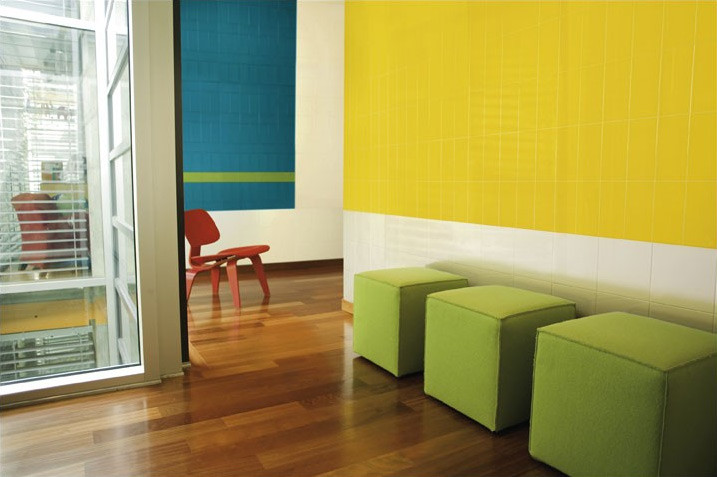 Ceramic tiles or more specifically, non-porcelain tiles, are generally made from red or white clay and fired in a kiln. Afterwards, they are given a durable glaze as a finish, which helps to preserve the color and pattern of the tile. In some cases,
Ceramic tiles or more specifically, non-porcelain tiles, are generally made from red or white clay and fired in a kiln. Afterwards, they are given a durable glaze as a finish, which helps to preserve the color and pattern of the tile. In some cases, 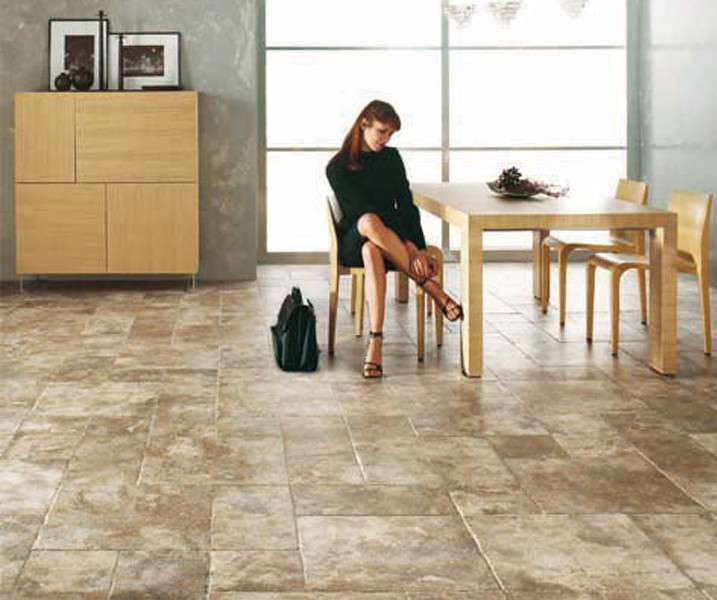 Developed from their ceramic tile counterparts, porcelain tiles fuse form and function, making them very popular among homeowners who want commercial-grade tile floors. Porcelain tile is designed by means of dust pressed method from clays mixed with feldspar and fired at much higher temperatures than ceramic tiles. As a result of this process, porcelain tiles are more dense, less porous, much harder, and less prone to moisture and stain absorption than ceramic tiles. Thus, porcelain tiles remain versatile–ideal for both indoor and outdoor applications. With a much lower water absorption rate (less than 0.5% to be exact), porcelain tiles are more frost-resistant or frost-proof than ceramic tiles.
Developed from their ceramic tile counterparts, porcelain tiles fuse form and function, making them very popular among homeowners who want commercial-grade tile floors. Porcelain tile is designed by means of dust pressed method from clays mixed with feldspar and fired at much higher temperatures than ceramic tiles. As a result of this process, porcelain tiles are more dense, less porous, much harder, and less prone to moisture and stain absorption than ceramic tiles. Thus, porcelain tiles remain versatile–ideal for both indoor and outdoor applications. With a much lower water absorption rate (less than 0.5% to be exact), porcelain tiles are more frost-resistant or frost-proof than ceramic tiles. 